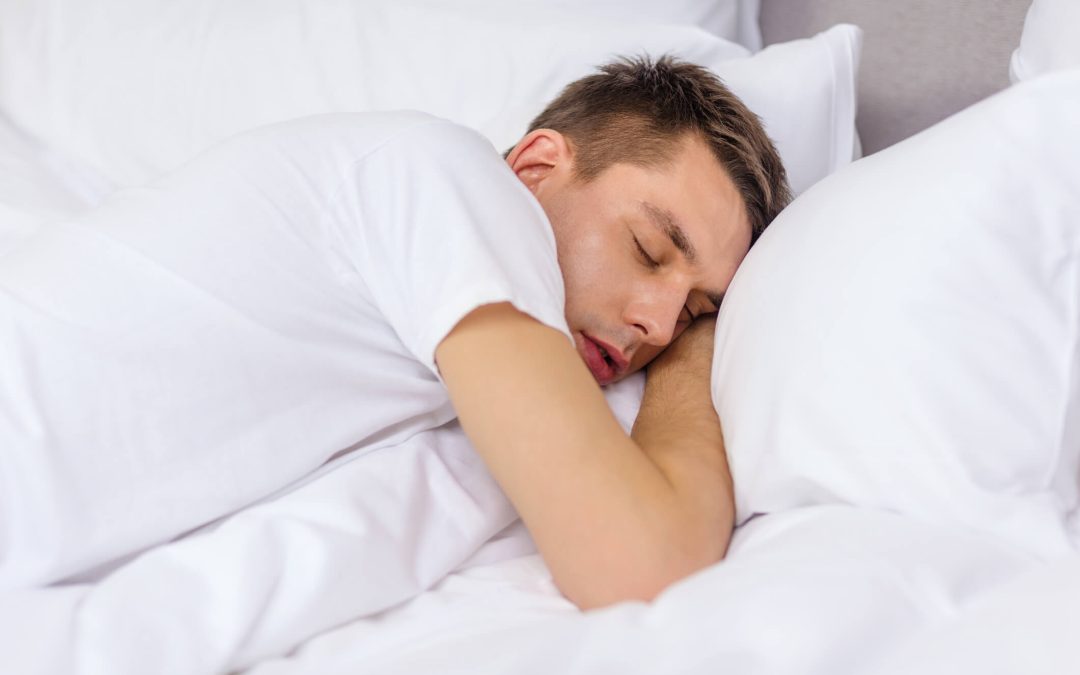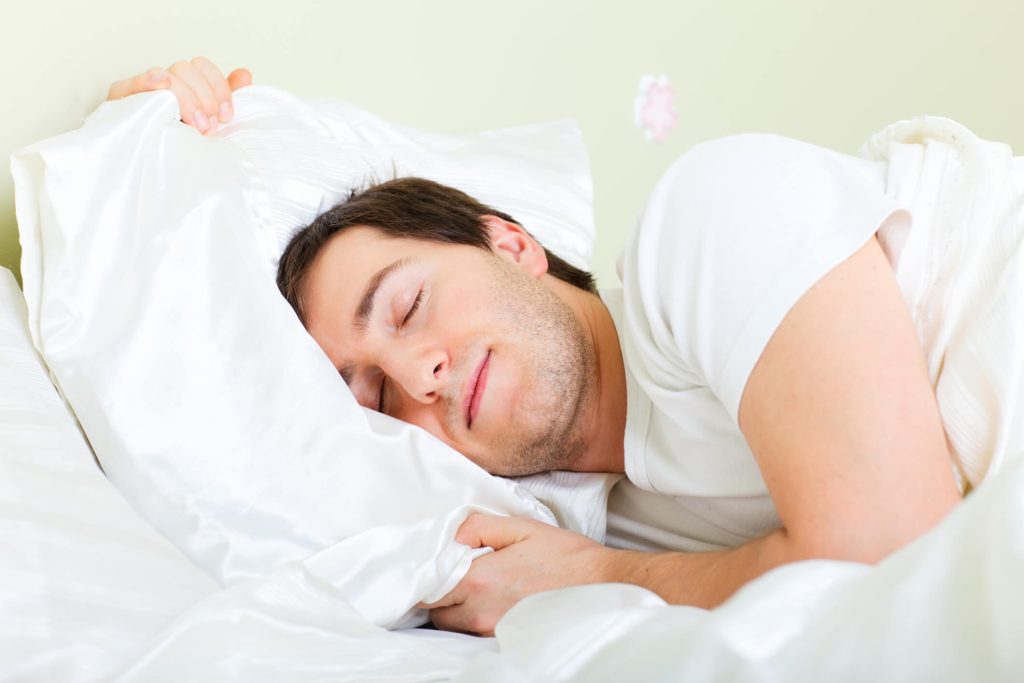Undergoing a hair transplant is a significant decision that requires careful consideration and planning. The recovery process is as necessary as the procedure to ensure you get the best results. At Neograft Hair Restoration Orange County, we aim to guide you through the recovery stages, starting with an often overlooked but essential aspect: how to sleep after your hair transplant surgery.
Proper sleep helps with overall healing and plays a critical role in maintaining the health of the newly transplanted hair follicles. During the early stages of your recovery, taking the proper steps to protect your scalp and grafts can significantly impact the success of your hair restoration. To maximize comfort and ensure proper rest, it is essential to follow specific instructions provided by your doctor. Sleeping correctly and using the right pillow will protect your grafts. The first few nights are crucial, and following the aftercare instructions is essential. The bandage around the recipient area must also be appropriately managed to ensure healing. Taking steps to relax and get proper rest at night will promote a smoother recovery and optimize the healing process.
Why Sleeping Properly After a Hair Transplant Is Crucial
After your hair transplant, grafts will be inserted into the recipient area of your scalp. These hair follicles are vulnerable in the first few days and weeks following the surgery. During this time, your hair grafts are being established in their new locations, and the scalp needs to be treated with care to avoid swelling, discomfort, or potential complications. It’s essential to follow the guidance provided during your consultation at our clinic, where our expert team will provide you with tips, information, and the best treatments for a successful recovery.
The swelling around your forehead, neck, or scalp is expected immediately after surgery. Pressure on the newly transplanted areas can negatively affect the grafts, compromising the results of your surgery. In addition to following proper sleep positions, you should also take precautions such as maintaining a healthy diet and avoiding activities that could disrupt the healing process. Special care is also needed for those undergoing FUE (Follicular Unit Extraction) for the donor area. Proper post-surgery care and attention to the hair loss treatment plan will help improve the outcome and ensure your hair transplants have the best possible success.
The Best Sleeping Positions After a Hair Transplant
One of the most common questions patients have after undergoing a hair transplant is, “How should I sleep after the procedure?” The answer is simple yet essential: You should sleep on your back with your head elevated. This position will minimize pressure on your scalp and grafts, reducing the chances of disturbing the healing process. Following the correct sleeping position is crucial during the recovery period after hair transplantation. Using a travel pillow to support your neck and head during sleep is also helpful, ensuring your head remains elevated. If you’ve had a FUE hair transplant, taking extra precautions during this time is essential to safeguard the grafts. Always consult your doctor for specific aftercare instructions to ensure the hair transplant procedure succeeds.
Sleeping on Your Back
Sleeping on your back allows you to maintain an optimal position with little risk of compressing your scalp. This position helps keep the recipient area undisturbed, giving grafts the best chance to heal successfully. Additionally, sleeping on your back can also help prevent swelling. Head elevation is critical in reducing inflammation after your operation. A pillow that elevates your head at a slight angle is highly recommended during the initial days of your recovery. The elevation helps facilitate blood supply to your hair follicles, promoting quicker recovery and reducing the risk of swelling. This advice is consistent with many posts and articles addressing the common question many patients ask after undergoing such procedures. Whether in this article or from your surgeon, always follow the instructions to ensure the best results.
Sleeping on Your Side or Stomach
It is crucial to avoid sleeping on your side or stomach after a hair transplant. These positions can pressure your newly transplanted grafts, potentially damaging them or causing poor hair growth. Since scabs can form during the early stages of healing, you also want to avoid disturbing them. Sleeping in a position that places your face or head against the pillow increases the risk of rubbing or irritating the transplanted areas, which could lead to infection or scarring. For better comfort and support, many patients use a recliner during the first few nights of recovery, as this can help elevate the head and reduce pressure.
If you’re traveling to places like Turkey for your procedure, ask your doctors about proper care instructions, such as hair-washing techniques. Also, ensure you have access to your surgeon for follow-up questions, especially regarding the hairline and any post-surgery concerns. Make sure you follow the dos and don’ts as prescribed. You should also avoid taking sleeping pills, as they can interfere with your ability to maintain a proper sleeping position. Remember to take care of the things that can help your healing process, including avoiding unnecessary pressure or friction on the scalp.
Using the Right Pillow
Choosing the right pillow for post-surgery sleep is critical. A regular pillow may not provide adequate support and could cause unnecessary friction or pressure on your scalp. Many patients find that using a unique recovery pillow designed for hair transplant patients is a helpful solution. These pillows are often designed to elevate your head and reduce the risk of rolling over during sleep. When selecting a pillow, it’s essential to consider the purpose of the pillow, which is to support your recovery and minimize the risk of damaging your newly transplanted grafts. Make sure to consent to any recommendations your doctor provides about pillows and sleep positions, ensuring you are fully informed.
The material of the pillowcase is also essential. Avoid using rough or abrasive materials that could irritate your sensitive scalp. A soft cotton pillowcase is typically ideal, as it will reduce friction against your skin and transplanted grafts. Many blogs and sites (including Instagram) also offer helpful tips on post-transplant recovery. If you sign up for post-surgery updates or instructions online, check for data privacy and storage policies. If you’re undergoing a FUT procedure, the recovery process may differ slightly, so following your specific routine is essential. You also have the option to seek advice from online communities or forums that share personal experiences and insights.
Avoiding Risky Activities
During the early recovery stages, avoiding certain activities could compromise your hair transplant and delay the healing process is crucial. These activities include:
- Alcohol: Drinking alcohol can lead to dehydration and impair the body’s ability to recover effectively. It’s best to avoid alcohol, especially during the first few days after surgery.
- Smoking: Smoking has been shown to impede circulation and slow the healing process. It’s important to refrain from smoking during the recovery period.
- Exercise: Strenuous physical activity can increase your heart rate, cause swelling, and potentially damage the transplanted grafts. Refrain from heavy exercise for at least two weeks after surgery. This includes avoiding any intense movements that could disrupt the healing process, especially those that involve your head or neck.
Additionally, ensure that you’re staying hydrated by drinking plenty of water and fluids to support the healing of your hair follicles and promote overall well-being. Side sleeping position should be avoided to prevent pressure on the incisions and neck area. Using a neck pillow is a great way to maintain proper positioning while sleeping. Many male patients also find that following these post-surgery recommendations helps boost their confidence in their recovery. For any FAQs or concerns, be sure to contact your surgeon via phone or their site, where they can provide answers and further guidance during your recovery.
Post-Surgery Hair Care While Sleeping
During sleep, you must continue protecting your scalp and hair follicles. The transplanted grafts are most vulnerable during the first few days and need to be handled with care. Following proper guidelines during this time is essential to achieving optimal hair transplant results.
- Avoid touching the recipient area: You might experience the urge to scratch your scalp or adjust the position of your grafts, but it’s essential not to do so. This can lead to discomfort and increase the risk of infection. Be mindful of the surface you sleep on, as rough materials could irritate your sensitive scalp.
- Keep your scalp clean: While sleeping, it’s essential to maintain cleanliness around the recipient area. Ensure your bed sheets are clean to avoid introducing dirt or bacteria into the surgical sites. Consider taking a shower in the morning and using a mild shampoo to gently clean your scalp, ensuring no debris or oils remain.
- Protect your scalp from the sun: Direct sunlight can damage the delicate hair follicle in the recipient area. While sleeping, ensure your scalp is shielded from bright lights or direct sunlight. Wear a soft hat for protection from your grafts during the day and avoid exposure when not resting.
Caring for your body also ensures you get enough minerals and vitamins to support hair growth. A balanced diet can provide the necessary nutrients to strengthen the grafts. Consult your Dr for more advice on the proper supplements. The blog offers advice, but follow credible sources and avoid anything that could interfere with your recovery. Remember that each type of transplant, whether FUT or FUE, might require slight variations in care, so always follow your surgeon’s instructions for the best recovery outcome.
Expected Recovery Issues to Watch Out For
During recovery, it’s normal to experience some mild discomfort or irritation. However, it is essential to know when these symptoms are typical in healing and when they might indicate a problem. Expected recovery issues include:
- Swelling: This can occur around the forehead, eyes, or neck area. Elevating your head while sleeping can help reduce this.
- Scabs: As the grafts begin to settle into their new location, scabs may form. While this is a normal part of the process, do not pick at the scabs, as this can disrupt the healing process and damage the grafts.
- Itching is expected as the scalp heals, but avoid scratching the recipient area. This can affect the hair follicles and hinder the growth of the transplanted hair.
- Inflammation: Some inflammation around the transplant area is expected. Using elevated pillows and avoiding pressure on the scalp can help alleviate this.
FAQs and Common Questions
How long should I sleep with my head elevated after a hair transplant?
- It is recommended that you sleep with your head elevated for at least 3 to 5 days following your hair transplant surgery. This will help minimize swelling and ensure proper blood circulation to your hair follicles.
Can I sleep on my side after the transplant?
- It is best to avoid sleeping sideways during the first few days post-surgery. Sleeping on your back with your head elevated is the safest position to avoid placing pressure on your grafts and recipient area.
What if I accidentally touch my scalp while sleeping?
- If you accidentally touch your scalp, it’s important not to panic. Just ensure that you don’t apply pressure on the grafts. Continue following the recommended aftercare steps and consult your surgeon if you’re concerned.
When can I return to regular sleeping positions?
- You can gradually return to your regular sleeping positions after 7 to 10 days once your grafts have settled and the initial swelling has subsided. Always check with your hair transplant surgeon before making any changes.
How should I clean my pillowcases during recovery?
- Pillowcases should be changed frequently to maintain cleanliness and avoid introducing bacteria or dirt to your sensitive scalp. Use a clean, soft cotton pillowcase that won’t irritate the scalp.
Can I use a regular pillow after my hair transplant?
- A regular pillow may not support your head and neck during recovery. Consider using a recovery pillow that keeps your head elevated and prevents pressure on the grafts.
Can I sleep with my hair wet after a transplant?
- It is generally recommended not to sleep with your hair wet after surgery. Wet hair can increase the risk of friction and irritation during sleep. Allow your scalp to dry naturally before going to bed.
How can I prevent scabbing from affecting my sleep?
- Scabs may form as your grafts begin to settle. Please avoid scratching or picking at them, disrupting the healing process. Using an elevated pillow and sleeping on your back will help minimize irritation.
Can I exercise during the first week after surgery?
- It’s important to avoid strenuous exercise, especially in the first week after your hair transplant. Physical activity can increase swelling, and heavy sweating can introduce bacteria to the scalp, leading to infection.
What is the best way to avoid swelling after a hair transplant?
- Sleeping with your head elevated is the most effective way to reduce swelling. This helps promote better blood circulation and keeps fluid from accumulating around the forehead and neck area.
Conclusion
Your sleeping position after a hair transplant is crucial to your recovery process. Following the proper sleeping habits will help ensure that your grafts remain undisturbed, minimizing the risks of complications such as swelling, scabbing, and discomfort. At Neograft Hair Restoration Orange County, we emphasize the importance of proper sleeping positions and provide services to guide your recovery. Always follow your hair transplant surgeon’s aftercare advice to ensure the best possible recovery and restoration results.
By elevating your head, avoiding side sleeping, and using the right pillows, you can ensure that your scalp heals properly and that your new hair grows as expected. If you have any questions or concerns about your recovery, don’t hesitate to contact the Neograft Hair Restoration Orange County team for expert guidance and support.















Recent Comments